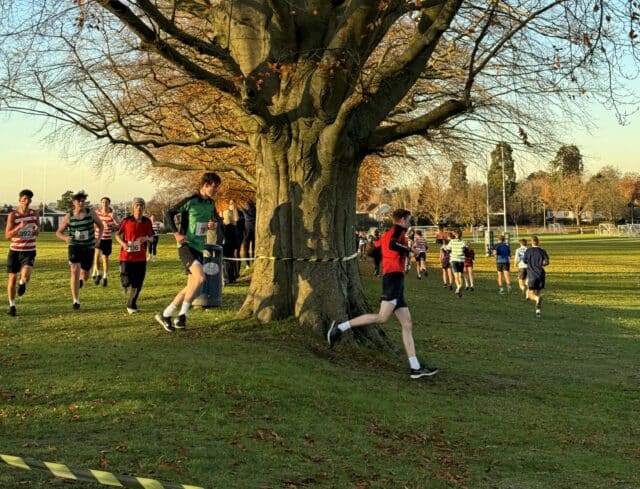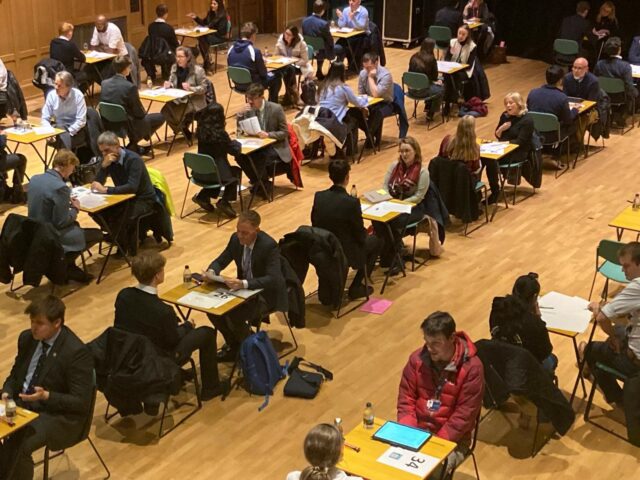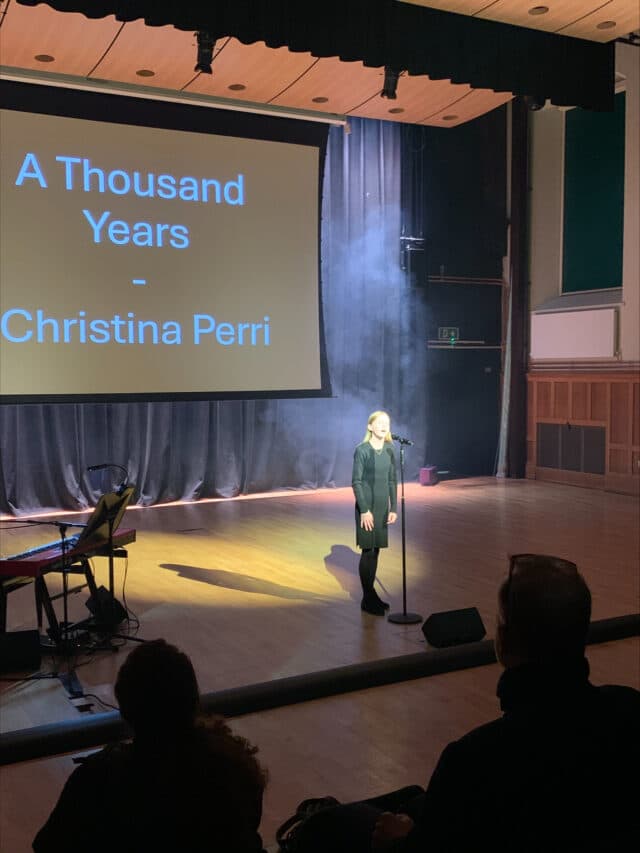A number of events have taken place over the past five days as part of the annual Epsom College Science Appreciation Week.
Organised jointly by the Biology, Chemistry and Physics departments, Science Appreciation Week is designed to encourage all pupils to explore science outside the formal curriculum and involves a number of exciting demonstrations and activities.
Birds of Prey
The Third Form met some of the most fearsome hunters in the animal kingdom, including a hawk, a peregrine falcon, a jack merlin falcon, a barn owl, an Indian eagle owl and a golden eagle. The birds are cared for at Dorset-based Xtreme Falconry and were brought to Epsom by Martin Ballam in order to explain how the birds have adapted to survive.
We were shown that a barn owl’s wings move silently, which enables it to use sonar to hunt for its prey. We also learnt that birds of prey would not attack animals that they are not adapted to catch efficiently. For example, an eagle will not attempt to catch a pigeon that flies in front of it because the eagle is heavy and chasing the pigeon would use too much energy, whereas the eagle will chase a rabbit down a hill, because the design of its body allows it to glide down in pursuit.
By Dougal Freeman (Hu)
Guest speaker, Antonia Stutter
On Tuesday we were fortunate enough to welcome guest speaker Antonia Stutter to speak to us about drug doping in the Olympics and her life studying Chemistry at Oxford University. She explained the many benefits of studying a science at university and gave us an honest insight into what life is like at such a prestigious university. She then spoke about her thesis and how tactics to avoid being caught doping had evolved over the years. Her talk was not only interesting but also gave us a new view on the topic. After her talk, many students had questions about topics ranging from her time at Oxford, to her view on creating a level playing field within the Olympics. Overall it was an amazing experience, and all those who attended will have learnt many things.
By Aiden Grant (G)
Origins: Think Universe! by Francisco Diego
Senior Teaching Fellow at the Department of Physics and Astronomy, UCL, vice president of the UK Association for Astronomy Education and a fellow of the Royal Astronomical Society, Francisco Diego is a keen populariser of natural sciences and has extensive experience as a planetarium producer/presenter, lecturer, author and broadcaster. He is a regular contributor to the BBC, Sky and Aljazeera News channels.
His most recent educational project is called Think Universe!, a novel and ambitious idea to bring fundamental science to the primary and secondary classroom with initial support from the Royal Society and the Science and Technology Facilities Council. The lecture contains elements of cosmology, particle physics, atomic structure, star and planet formation, complex molecules, life, massive life extinctions and environmentalism.
A review by Theo Mully (P):
“What better way is there to kick off science week than an intriguing talk regarding the creation of our universe by the world-renowned Dr Francisco Diego; vice president of the UK Association for Astronomy Education and presenter of the show GENIUS: by Steven Hawking.
During the talk, Dr Francisco guided members of the Sixth Form through a scientific journey from the Big Bang to the creation of the universe and ultimately to the very planet that we are living on.
Painting a detailed timeline of events occurring in every eon, he explained how the Big Bang led to the formation of the elements hydrogen and helium, and how other elements in the periodic table were made by subsequent supernovas.
“He emphasised how magical and coincidental it is that the right conditions needed for Earth just seemingly occurred one after another: the Big Splash (the collision of the Earth and Theia), eukaryotic cell evolution, and the wonders of the element Carbon, which allow life to flourish – an ability no other element is able to replicate, even silicon. This led to a discussion on the possible existence of an alien species on other planets.
“Dr Francisco Diego concluded the talk by reminding us of the beauty of our planet – a paradise that can be described as hell just only a few eons back – in hope that we all will treasure and care for nature to the best of our abilities and not damage our already fragile environment.”
The Air Show
The Fifth Form witnessed the fascinating Air Show science lecture. The lecture was both very funny and informative at the same time, with many fascinating experiments to highlight particles in the air. Many lucky pupils were given the opportunity to interact with the experiments, which proved to be a lot of fun. Overall, the Air Show science lecture was a highly enjoyable morning for the Fifth Form and a great way to finish Epsom College’s Science Appreciation Week.
By Theo Mully (P)
Scientific Policy lecture, by Emma Greenwood
Last Wednesday, Science and Politics students from Epsom’s Sixth Form were lucky enough to welcome Emma Greenwood to the College. Emmas gave a presentation about her career as Director of Policy and Public Affairs for Cancer Research UK. She is responsible for the charity influencing work across a wide range of public policy issues – including raising public awareness of the signs and symptoms of cancer and improving the rates of early diagnosis of cancer.
Emma’s talk was insightful and engaging – intertwining the scientific aspect of her work with the political meant that every student came away having learnt something new.
She spoke to us about how she began working at a publishing company, before soon realising the work wasn’t for her and joining Cancer Research UK. She ran us through a day in her life and told us about opportunities to apply for work or apprenticeship at Cancer Research UK. Following the talk, a few of us were lucky enough to have lunch with Emma herself – a lively debate regarding the problem of evil and suffering dominated the conversation and it was incredibly interesting to hear Emma’s opinion on the issue, seeing as she has worked closely with cancer patients for just over a decade.
By Emily Vandrau (R)





